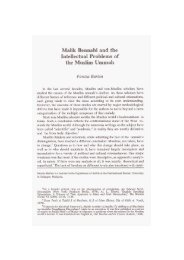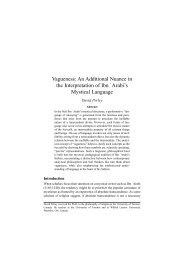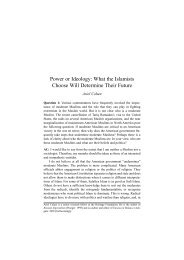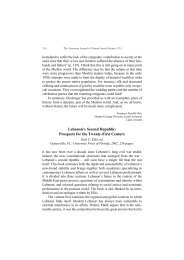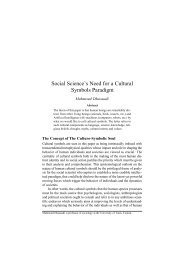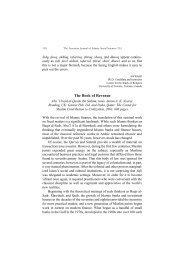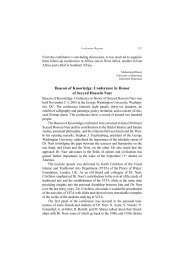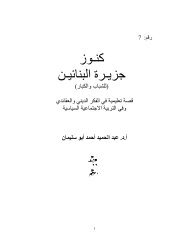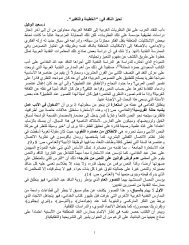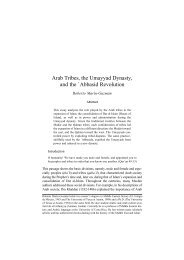The First Annual Muslim Peacebuilding and Justice ... - I-Epistemology
The First Annual Muslim Peacebuilding and Justice ... - I-Epistemology
The First Annual Muslim Peacebuilding and Justice ... - I-Epistemology
Create successful ePaper yourself
Turn your PDF publications into a flip-book with our unique Google optimized e-Paper software.
Conference, Symposium, <strong>and</strong> Panel Reports<br />
<strong>The</strong> <strong>First</strong> <strong>Annual</strong> <strong>Muslim</strong> <strong>Peacebuilding</strong>,<br />
<strong>Justice</strong>, <strong>and</strong> Interfaith Dialogue<br />
<strong>The</strong> <strong>First</strong> <strong>Annual</strong> <strong>Muslim</strong> <strong>Peacebuilding</strong>, <strong>Justice</strong>, <strong>and</strong> Interfaith Dialogue<br />
was held on 28-30 April 2006. Sponsored by the Salam Institute for Peace<br />
<strong>and</strong> <strong>Justice</strong> (SIPJ) <strong>and</strong> the Islamic Society of North America (ISNA), it was<br />
made possible through a Conflict Transformation Grant, in part with the<br />
Fuller <strong>The</strong>ological Seminary, <strong>and</strong> the generous support provided by the<br />
Mohammed Said Farsi Chair of Islamic Peace at American University.<br />
<strong>The</strong> conference was opened by Mohammed Abu-Nimer (SIPJ) <strong>and</strong><br />
Louay Safi (ISNA). Abu-Nimer explained that this event was being held to<br />
“systematically think about the Islamic perspectives of peacebuilding, conflict<br />
resolution, <strong>and</strong> interfaith dialogue, <strong>and</strong> to attempt to bring it into the<br />
American public context.” Safi mentioned that “it is crucial that we learn<br />
how to prevent <strong>and</strong> resolve these inevitable conflicts.” After these opening<br />
remarks, the panel sessions began.<br />
Panel 1, “Peace through Development: Experiences from <strong>Muslim</strong> Communities<br />
<strong>and</strong> the <strong>Muslim</strong> World,” discussed the effect of development practices<br />
in <strong>Muslim</strong> communities on the peace <strong>and</strong> sustainability of both these<br />
communities themselves <strong>and</strong> their outside interactions. Kathleen Meilahn<br />
spoke about the United States’ inability to create a sustainable peace in Iraq<br />
due to its lack of cultural <strong>and</strong> religious underst<strong>and</strong>ing. She was followed by<br />
Ayse Kadayifici-Orellana, who presented the SIPJ’s study on <strong>Muslim</strong><br />
Peacebuilders in Africa <strong>and</strong> the Balkans. Her major findings included the<br />
use of <strong>and</strong> the need to exp<strong>and</strong> the concept of tawhid (that all of creation<br />
emanates from God) <strong>and</strong> therefore must underst<strong>and</strong> unity through plurality.<br />
Putut Widjanarko’s presentation focused on the <strong>Muslim</strong> community’s contribution<br />
to reducing ethnic differences within Islam.<br />
Panel 2, “Intra-<strong>Muslim</strong> Dialogue,” focused on the need for intra-faith<br />
dialogue among <strong>Muslim</strong>s. <strong>The</strong> presenters pinpointed the Sunni-Shi`ah spilt,<br />
differences between converted <strong>Muslim</strong>s <strong>and</strong> born <strong>Muslim</strong>s, <strong>and</strong> ideological
150 <strong>The</strong> American Journal of Islamic Social Sciences 23:4<br />
differences within the American <strong>Muslim</strong> community. Panel 3, “Islamic<br />
Approaches to Mediation <strong>and</strong> Conflict Resolution,” opened with Imam<br />
Muhammad Shafiq’s survey of the state of conflict resolution <strong>and</strong> dialogue in<br />
the <strong>Muslim</strong> world. He exp<strong>and</strong>ed on the point that <strong>Muslim</strong> communities are<br />
more willing to participate in interfaith dialogue then intra-faith dialogue.<br />
Abd al-Hayy Weinman <strong>and</strong> Mohamed H. Mukhtar then exp<strong>and</strong>ed on the<br />
Islamic principals that can achieve mediation <strong>and</strong> conflict resolution. One of<br />
these is jama`ah, an African <strong>Muslim</strong> practice of creating a neutral buffer zone<br />
in the middle of a conflict zone to serve as a new community for victims.<br />
Panel 4, “<strong>Peacebuilding</strong>, Democracy, <strong>and</strong> Human Rights in the Islamic<br />
Context,” clarified the place of these three themes in Islam by discussing<br />
their historical <strong>and</strong> current applications. <strong>The</strong> case studies included both the<br />
historical <strong>and</strong> current place of <strong>Muslim</strong> women in peacebuilding, historical<br />
examples of the civil <strong>and</strong> pacifist strategies used during the Makkan period,<br />
<strong>and</strong> the 2006 Palestinian elections. Panel 5, “Islamic Approaches for Interfaith<br />
Dialogue,” provided several examples of interfaith dialogue by <strong>Muslim</strong>s,<br />
including the creation of a game designed to encourage this activity.<br />
Imam Kazerooni spoke on the role of civil society in interfaith dialogue, <strong>and</strong><br />
Junaid Ahmed dwelt on the need to move beyond just dialogue to interfaith<br />
solidarity <strong>and</strong> justice campaigns<br />
Panel 6, “Successes, Lessons Learned, <strong>and</strong> Challenges Facing <strong>Muslim</strong>s<br />
<strong>and</strong> <strong>Muslim</strong> Organization Working for Peace <strong>and</strong> <strong>Justice</strong>,” reviewed the<br />
importance of <strong>Muslim</strong> organizations working for peace as well as their challenges.<br />
<strong>The</strong> Interfaith Youth Core (IYC), based out of Chicago, <strong>and</strong> the<br />
American <strong>Muslim</strong> Voice (AMV) were highlighted. <strong>The</strong> IYC focuses not just<br />
on dialogue, but also on coordinated action (e.g., community service) to create<br />
true underst<strong>and</strong>ing. AMV representatives discussed their strategies for<br />
dealing with insufficient funds <strong>and</strong> communication with other organizations.<br />
<strong>The</strong> Special Session, “<strong>The</strong> Network of <strong>Muslim</strong> <strong>Peacebuilding</strong> <strong>and</strong><br />
Interfaith Dialogue,” included representatives of the founding organizations<br />
of the Network for <strong>Muslim</strong> <strong>Peacebuilding</strong> <strong>and</strong> Interfaith Dialogue, among<br />
them Kadayifici-Orellana, Safi, Imam Mohammed Shafiq (Center for Interfaith<br />
Studies <strong>and</strong> Dialogue, Nazareth College), Rabia Harris (<strong>Muslim</strong> Peace<br />
Fellowship), Rashied Omar (Kroc Institute, University of Notre Dame), <strong>and</strong><br />
Imam Taqi-Baker (Free <strong>Muslim</strong> Association). This discussion included<br />
making the network accessible to other practitioners, including young people.<br />
<strong>The</strong>re were also warnings about succumbing to a nationalist overtone<br />
<strong>and</strong> a need to reach out to different ethnic groups.<br />
Several themes emerged in the course of this event, among them the following:<br />
the relationship between Islam <strong>and</strong> culture, the need for intra-faith
Conference, Symposium, <strong>and</strong> Panel Reports 151<br />
dialogue between Sunnis <strong>and</strong> Shi`ahs, the need to underst<strong>and</strong> Islam’s internal<br />
diversity, recovering Islamic nonviolence from the early tradition, moving<br />
toward the sh´ra (consultation) model of community, bringing women’s<br />
voices into intra-faith dialogue, identifying the main Sunni <strong>and</strong> Shi`ah leaders<br />
for training <strong>and</strong> dissemination, learning how to “tolerate the intolerant,”<br />
<strong>and</strong> the need for the American <strong>Muslim</strong> community to engage in dialogue<br />
with the larger American society.<br />
This event closed with a call to integrate Shi`ahs into American <strong>Muslim</strong><br />
community organizations <strong>and</strong> spotlighted the need to establish a dialogue<br />
between both groups. It was pointed out that ISNA’s first two presidents<br />
were Shi`ah. In addition, it was suggested that programs should be designed<br />
to initiate this rapprochement <strong>and</strong> that they could even be used as an outreach<br />
mechanism to the entire community. It was also suggested that anthropologists<br />
<strong>and</strong> sociologists continue to be employed to evaluate the movement,<br />
as this will help both practitioners <strong>and</strong> academics remain critical <strong>and</strong><br />
reflective, both academically <strong>and</strong> spiritually, while pursuing their work.<br />
Ashleigh Zimmerman<br />
<strong>Annual</strong> Conference Manager, Salam Institute for Peace <strong>and</strong> <strong>Justice</strong><br />
Washington, DC<br />
Globalization <strong>and</strong> Trans-nationalism<br />
On 10 August 2006, <strong>The</strong> National Advisory Council for South Asian Affairs<br />
(NACSAA) met at the Cosmos Club in Washington, DC, to answer several<br />
questions: Do markets know best? Does the market really know? Are the rich<br />
getting richer <strong>and</strong> the poor getting poorer? Does globalization mean<br />
Westernization <strong>and</strong>/or Americanization? Are traditional societies being dissipated?<br />
As there were many speakers, I will present only brief summaries.<br />
Shabir Ahmed stated that the West uses its foreign aid to get countries<br />
to follow its own st<strong>and</strong>ards <strong>and</strong> perspectives, while many members of the<br />
elites have ab<strong>and</strong>oned the traditional lifestyle. On the positive side, globalization<br />
solves poverty through the market. Syed Akhtar asked whether globalization<br />
was the same as McDonaldization or Nikeification, or just about<br />
cultural domination <strong>and</strong> sweatshops. He sees globalization as a win-win situation,<br />
provided that a nation has the necessary “enabling conditions”: a<br />
highly educated workforce, the rule of law, <strong>and</strong> democratic institutions.<br />
V. Balach<strong>and</strong>ran reminded the audience that globalization also causes<br />
problems. In India, this takes the form of increasing farmer suicides, shanty<br />
towns, a lack of investment in the agricultural sector, a decrease in the qual-



